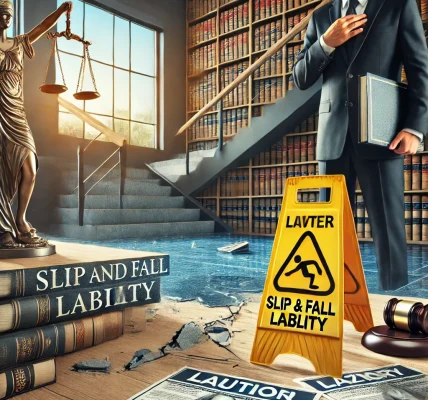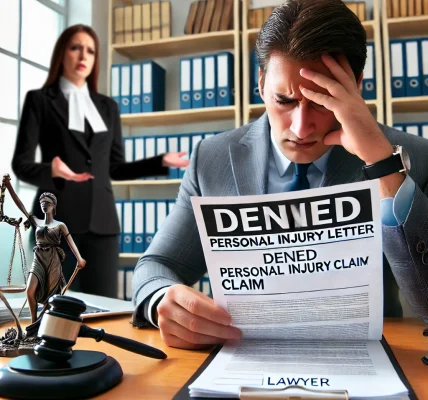Introduction
If you have been injured due to an accident, you may wonder whether you should file a personal injury claim or a workers’ compensation claim. While both options provide compensation for injuries, they are fundamentally different in terms of eligibility, benefits, and legal processes.
Understanding these differences is crucial for injured individuals seeking fair compensation. In this article, we will break down the key distinctions between personal injury claims and workers’ compensation claims, helping you make the right decision for your situation.
What Is a Personal Injury Claim?
A personal injury claim is a legal action taken by an injured person against another party who is at fault for their injury. These claims are usually based on negligence, meaning that the injured person must prove that the other party acted carelessly, leading to the injury.
Common Types of Personal Injury Cases:
- Car accidents (caused by reckless or negligent drivers)
- Slip and fall accidents (due to hazardous conditions on someone else’s property)
- Medical malpractice (caused by negligence from healthcare professionals)
- Product liability (injuries from defective products)
- Dog bites (when an owner fails to control their pet)
Key Elements of a Personal Injury Claim
To succeed in a personal injury claim, the injured party must prove:
- Duty of Care: The defendant had a duty to act safely (e.g., a driver must follow traffic laws).
- Breach of Duty: The defendant failed to act responsibly.
- Causation: The breach of duty directly caused the injury.
- Damages: The injured party suffered losses (medical bills, lost wages, pain and suffering, etc.).
Compensation in Personal Injury Cases
If a personal injury claim is successful, the injured person may receive:
- Medical expenses (past, present, and future)
- Lost wages (due to the inability to work)
- Pain and suffering (emotional and physical distress)
- Punitive damages (if the defendant’s actions were reckless or intentional)
What Is a Workers’ Compensation Claim?
Workers’ compensation is a type of insurance that provides benefits to employees who are injured while performing their job duties. Unlike personal injury claims, workers’ compensation claims do not require proof of negligence. Even if an employer was not at fault, the injured worker is still entitled to benefits.
Common Workplace Injuries Covered by Workers’ Compensation:
- Slip and falls at the workplace
- Repetitive strain injuries (e.g., carpal tunnel syndrome from desk work)
- Machine-related accidents (in construction or factory settings)
- Exposure to toxic chemicals
- Work-related car accidents
Key Aspects of a Workers’ Compensation Claim
- No-Fault System: Employees do not need to prove employer negligence.
- Limited Compensation: Employees receive medical benefits and lost wages, but not pain and suffering damages.
- Employer Protection: In exchange for benefits, employees cannot sue their employer for injuries.
Benefits of Workers’ Compensation
- Medical coverage (doctor visits, surgeries, rehabilitation)
- Wage replacement (usually a percentage of lost wages)
- Disability benefits (for temporary or permanent disability)
- Vocational rehabilitation (if unable to return to previous work)
Key Differences Between Personal Injury and Workers’ Compensation
| Factor | Personal Injury Claim | Workers’ Compensation |
|---|---|---|
| Fault Requirement | Must prove negligence | No need to prove fault |
| Who Can File? | Anyone injured due to someone else’s fault | Only employees injured on the job |
| Types of Compensation | Medical bills, lost wages, pain and suffering, punitive damages | Medical bills, lost wages, disability benefits (no pain and suffering) |
| Can You Sue? | Yes, can sue the at-fault party | No, cannot sue employer (except in rare cases) |
| Settlement Process | Handled through courts or insurance negotiations | Handled through employer’s workers’ compensation insurance |
When Should You File a Personal Injury Claim?
You should file a personal injury claim if:
- The injury was caused by someone else’s negligence.
- You want to seek compensation beyond medical expenses, such as pain and suffering.
- The at-fault party is not your employer.
- You were injured outside of work (e.g., in a car accident).
When Should You File a Workers’ Compensation Claim?
You should file a workers’ compensation claim if:
- You were injured while performing job duties.
- You do not need to prove fault.
- You need coverage for medical expenses and lost wages.
- You are willing to forfeit the right to sue your employer.
Can You File Both a Personal Injury and a Workers’ Compensation Claim?
Yes, in some situations, you may be able to file both claims. This is known as a third-party claim. For example:
- If a delivery driver is injured in a car accident caused by another driver, they can file a workers’ compensation claim through their employer and a personal injury claim against the at-fault driver.
- If a construction worker is injured due to faulty equipment, they may have a workers’ compensation claim against their employer and a product liability lawsuit against the manufacturer.
Conclusion
Understanding the difference between personal injury claims and workers’ compensation claims is essential when seeking compensation for an injury. While both offer financial relief, they operate under different rules and limitations.
- If the injury was caused by someone else’s negligence, a personal injury claim may offer broader compensation.
- If the injury occurred at work, workers’ compensation provides quicker benefits without needing to prove fault.
Before filing any claim, consult with a qualified personal injury attorney to determine the best course of action based on your situation. Proper legal guidance ensures you receive the compensation you deserve while avoiding legal pitfalls.




